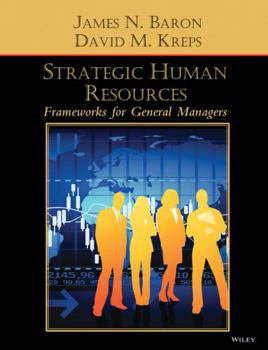Strategic Human Resources: Frameworks for General Managers
Select Format
Select Condition 
Book Overview
A Truly Strategic Approach Geared to General Managers, Strategic Human Resources is an exciting new approach to human resource management. Rather than focusing the material on the needs of the HR manager or HR major, this conceptual text speaks to the general manager who needs to be strategically aware of HR issues. This important new text was born out of Stanford's required HRM course for MBAs and further developed in Executive Education...
Format:Hardcover
Language:English
ISBN:0471072532
ISBN13:9780471072539
Release Date:April 1999
Publisher:Wiley
Length:602 Pages
Weight:2.60 lbs.
Dimensions:1.1" x 7.5" x 9.6"
Customer Reviews
4 ratings
superb text in modern micro theory applied to human resource management
Published by Thriftbooks.com User , 14 years ago
To get an idea what this text is about if you are an economist, or an economics student, start your reading in chapter 4 Employment and Economics. There you will realise that almost nothing you learned as an undergrad in economics - demand and supply, consumer optimization, neoclassical cost functions, monopoly oligopoly and competitive industries - will prepare you for understanding employment relationships. But the economics for which Oliver Williamson just got his Nobel prize will matter - and Kreps and Baron are wonderful expositors of this sort of economic theory....not in the abstract, but applied to employment relationships/transactions. Employment is often an open-ended transaction, with the detail specified only as time passes (after the transaction has been entered into) and relevant contingencies arise - salaries/commissions in years ahead, future promotion prospects, future job assignments, etc. Just how these details are filled in depends on a system of interlocking factors and behaviors: decision making rights and privileges specified in law (common law or legislation or both), by explicit, but incomplete, contractual details, and most importantly by tradition and common practices that have evolved with some history. But why do these customs have any force? Why does anyone believe them? Well one problem in an employment relationship, on either or both employer and employee sides, is that as time passes and the relationship matures both parties may face large costs of switching to alternatives - alternative jobs, or alternative workers. Replacing and retraining skilled knowledgeable workers may be costly, especially if it has to be done quickly in a time of high product demand - and those workers may know that; Finding alternative jobs with comparable pay and with comparable skills in alternative locations may be costly for workers - and employers may know that. So each is very aware that the other party to the transaction might act opportunistically to extract something from them - either or both parties can get very worried about "hold-ups". So how does one protect against hold-ups when efficiency in employment depends on being able to adapt flexibly as well as to have workers and employers invest specifically in one another - ie in the joint enterprise - since this makes you even more exposed to hold-ups. The answer - ie the needed protections - lie in the phenomena of "reputations". These reputation systems rely on history, culture (internal and external), customs, traditions, and shared beliefs expectations. Kreps and Baron are masterful analysts of the conditions under which reputations can, can't, and might be relied upon to offer guarantees. A long way from demand and supply , non? And much more interesting. So in the res t of the book your are going to have some amazing new insights - and examples - about internal promotion ladders, recruitment , retention, incentives, performance evaluation, performance pay, job design
The best book on strategic human resources I have ever read!
Published by Thriftbooks.com User , 25 years ago
Baron & Kreps write with wit & grace, pulling together a vast amount of literature to make their point that human resource management is critical to a firm's success. In every chapter, they get to the point quickly, writing for students in a way that faculty will appreciate. They retain the essence of the academic research on which their principles are based, while focusing on what it all means for managers. I highly recommend this book.
A major achievement in an underserved field
Published by Thriftbooks.com User , 25 years ago
Essential reading for both general managers and human resource executives, this book breaks new ground in several ways. First, the authors present human resources as a critical part of a SYSTEM, integrated with the company's external environment, workforce, culture, strategy and production methods, rather than as an isolated or downstream activity.Second, they bring insights from economics, sociology and social psychology to the topic, in a powerful way. The four appendices alone (transaction cost economics, game theory, agency theory and market signaling) are worth the price of the book.Third, they avoid the trap of "best practice", where an author looks at a few successful firms (GE? PepsiCo? 3M?) and encourages others to imitate them. In contrast, this book offers clues to creating real and inimitable competitive advantage from a company's human resource management. The entire treatment is readable and rich in cases.
No-bull human resources
Published by Thriftbooks.com User , 25 years ago
I had the fortune to have access to early versions of some chapters of this book, and it changed my opinion about human resources. They present the issues surrounding human resources management using frameworks that come from economics and organizational science, not from opinions and feelings...





